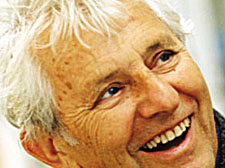
Poet Dannie Abse |
Sad, sad songs of the poet living with grief
Poet Dannie Abse’s wife died in a car crash last year and he doubts whether he will write any poetry again writes Gerald Isaaman
Running Late by Dannie Abse
Hutchinson, £9.99 order this book
DANNIE Abse tells things as they are, and more so, as you might expect from a doctor who is a celebrated poet. And who is now 82, a solitary man of sorrow and grief following the death of his wife, Joan, in a car crash last year.
He was walking early one morning in Golders Hill Park, a favourite haunt near his home. “There was nobody about except for someone who was jogging,” he recalls.
“Then suddenly beyond the tennis courts, suddenly I saw a woman coming towards me, an old lady.
“And I could see she had a determined look on her face as she came towards me and said, Mr Abse? Yes. I meant to write to you when your wife died. Thank you. She said, My husband died, I think she said in November. And I said Sorry.
“Then she threw herself into my arms. And I hugged her. Then she went away.”
He is too moved to talk on about this brief, simple moment of human tenderness. Indeed, he finds he cries too much, lives alone in the house in Hodford Road, Golders Green, he now calls his sanctuary, finding himself the victim of the classical symptoms of bereavement.
He has lost confidence, as well as weight, rarely drives his car in case he is hit in the rear, as he was in the road crash which killed his wife, refuses to return to his native Wales because it is so redolent with memories, and doubts whether he will write any poetry again.
Fortunately, we have Running Late, a new collection of his work dating back three years, with a cover picture showing a howling dog on a seashore, a slice in fact of Turner’s painting Dawn after the Wreck, itself a poignant pointer to his sadness.
They include love poems, in particular the only two he has written since the catastrophe, one called Lachrymae, which begins:
“I went to her funeral/cried/I went home that was not home.
And ends:
Now, solemn, I watch/the spellbound moon again/its gnostic clone drowned/Hampstead’s rush-dark pond/where a lone swan sings/without a sound.”
The other, Postcard to his Wife reads:
“I confess without you/I know the impoverishment of self/and the Venus de Milo is only stone.
“It is a Freudian wishful dream that she hasn’t just gone,” he tells me. “But I didn’t date it like all the other poems in the book.”
He is a sage, a storyteller who mocks the moments of contradiction and ambiguity that envelope life. So you always know that there is something remarkable and lovely and joyful lurking in his poetry, and his prose, as you will find in this embracing collection.
He describes snow “white as a frightened eye”, remembers “the candy minutes when we courted”, declares, “I’d rather be in hell with one woman than in heaven with all those sexless angels” and sums up the ugly world as Haman (who appears in the Bible’s Book of Ester – described as the archetypal evil man) and Hitler and Saddam,
The Lebanon conflict worries him and he recalls how an Israeli poet turned politician who told him: “We don’t start wars unless we think we can win them.” And Abse adds: “Well, this time I don’t think they can win.”
Life is dramatically different without his wife.
“When I wake up now I’m more self-regarding,” he explains.
“I come down into an empty house and make myself breakfast. And I listen to the radio for the news. Sometimes I want to weep. I am absolutely amazed by the transformation of myself.”
He is writing a journal, a kind of therapeutic exercise relating to Then and Now.
“It’s not exactly full of cheer,” he admits. “But if you are a writer all your adult life you have to imagine a reader, it’s impossible not to imagine a reader. Sometimes I find myself addressing Joan, I think. But it’s faceless most of the time.”
As to poetry, he says: “The spark, the inspiration for writing can come out of the blue. I’ve always liked Louis Pasteur’s dictum, ‘Chance favours the prepared mind’. In the past my mind was prepared to write poems. Now the chance has faded.”
But behind the anguish you can still detect his eternally inquiring mind, the minutiae and detail in his poems drawing you into his sensitive, intimate world, while at present his thoughts are on Elaine Pagels’ book The Origins of Satan.
“His ideas are still very potent for many people, hell and heaven,” he insists. “If there is no heaven and hell then there is no Satan. When I look across the road, metaphorically, and see how some people behave, they can’t be the same species as me.”
Yet such simplicity cannot be real. I prefer his story of the ancient Mongols who besieged a town in China, where the population had eaten their horses and were now starving and without water.
“So that moonlight night, the general climbs on to the battlements, sees below all the tents of the Mongols spread out below, and he plays an old Mongolian tune on his pipe,” Abse recounts.
“And the Mongolian soldiers come out of their tents full of nostalgia, pack up their weapons and go home.”
Then he ruefully adds: “I think it is probably true, except that, in my poem about the siege, the general plays the pipe badly. And the soldiers don’t go home.”
|


